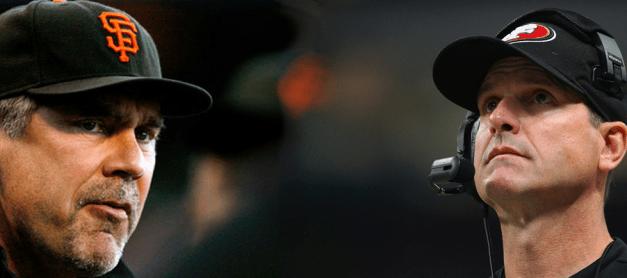I have lived in the bay area for the past 15+ years, and in San Francisco, we are going through a sports renaissance: the Giants have won two of the last three World Series, and the 49ers have made it deep into the playoffs two years running (I’m looking for a championship next year!). Both teams have something in common and it has led to something amazing. Bruce Bochy for the Giants and Jim Harbaugh for the 49ers are amazing leaders and brilliant strategists at their sports. Coupling strong leadership and a deep understanding of their sports and their athletes is a formidable combination.
The impact of good leadership is clear: Harbaugh took the previous year’s roster and squeezed nine more wins out of his first season. Bochy works with a middle-of-the-road payroll, but manages to coax incredible performance from his players time and time again. Both are unafraid to take risks, too. Harbaugh benched veteran quarterback Alex Smith for the potential he saw in Colin Kaepernick. Bochy has made several controversial decisions, taking two-time Cy Young award winner Tim Lincemun out of the bullpen, and leaving the $126 million Barry Zito off the roster for the 2010 postseason. Their willingness to gamble on unconventional solutions is the foundation of their success.
Let’s take another example: Ron Johnson at JC Penney. Johnson is a retail legend for his accomplishments at Apple. His decade of leadership oversaw the creation of Apple’s unique retail space, led by the groundbreaking Genius Bar, and JC Penney brought him onboard in late 2011, hoping to duplicate Johnson’s success across the retailer’s department stores.
Unfortunately for JC Penney, something went wrong. In what may be one of the most stunning turnarounds in CEO history, Johnson was fired just one year into his tenure after botching financial progressions so badly that the company has rehired its previous CEO and is rumoured to be looking for a buyer. Over the last fiscal year, the company saw a 25% drop in sales, posted a net loss of $985 million, and released an advertisement apologizing for Johnson’s sweeping changes and imploring customers to return to the department store.
How did his success turn into such a disastrous failure in so little time? Johnson’s mistakes were built from the wrong playbook – one he developed for years at Apple, but was ultimately unsuited for JCPenney. He also missed a vital piece of the puzzle that both of our sports paragons are renowned for: stakeholder buy-in. Harbaugh’s “demonstrative intensity” on the sidelines is legendary, and Bochy has built such a strong team culture that neither Lincemun nor Zito complained when they were demoted to the bench. Johnson, on the other hand, took one look at JCPenney and decided to change it all, and forcing his strategy on his employees and customers ended in disaster.
Corporate strategy is not a one size fits all, and both internal and external clarity on the company’s ambitions are tremendously important. When I joined ISC as its president we had one website and one identity, even though the we were clearly accomplishing two missions. The first had to do with making the Internet faster, safer, and more resilient by contributing open source code and making contributions to key Internet protocols (as well being one of the Internet’s 12 root servers operators, F-Root). We were also providing commercial services to fund these efforts. This was the impetus to create DNSco: we needed to create two entities so that we could achieve both missions without compromising either.
Great leadership takes both competence and a strategy that is right for the company, and you must take care not to alienate your customer base when you switch strategies. ISC has natural customers that will always know it as a public benefit entity and a research think tank. On the other hand, many large Fortune 500 companies need DNSco’s services. Since DNS has become one of the core pillars of network connectivity and reliability we believe we are in a good position for solid growth.

